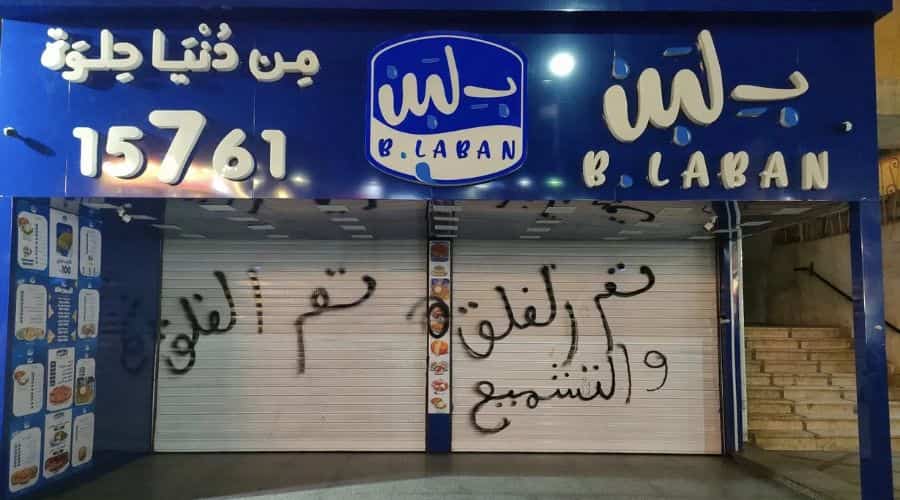Food & Climate- Yousef Ahmed:
Many are anticipating the opening of the renowned Egyptian dessert chain B.Laban has recently been at the center of a significant food safety controversy, leading to the temporary closure of numerous branches across Saudi Arabia and Egypt. The closures were prompted by reports of food poisoning and subsequent investigations that uncovered serious health violations.
In late March 2025, Saudi health authorities ordered the closure of all B.Laban branches in the kingdom after more than 26 individuals reported symptoms consistent with food poisoning, including nausea, vomiting, and severe stomach pain.
These incidents were linked to products consumed from B.Laban outlets. In response, inspection teams conducted surprise visits to all B.Laban branches in Riyadh, resulting in their complete closure. Food samples were confiscated for laboratory analysis, and delivery services from apps like Jahez and HungerStation were suspended.
The Saudi Food and Drug Authority, in coordination with the Ministry of Health and Riyadh Municipality, launched a comprehensive investigation into the incident. The investigation aimed to assess the food ingredients used in the stores, preservation, refrigeration, transportation, and storage methods, as well as supply chains and external sourcing. Health records of workers, hygiene, and sterilization practices were also examined, according many reports seen by “Food & Climate” platform.
Inspections across B.Laban outlets in Egypt
Shortly after the incidents in Saudi Arabia, Egypt’s National Food Safety Authority (NFSA) initiated a series of inspections across B.Laban outlets in the country.
The inspections revealed serious health violations. In a statement, the NFSA said that food samples collected from more than 47 outlets across the country tested positive for bacteria commonly linked to food poisoning.
The authority also reported the use of banned food coloring agents, spoiled or mishandled ingredients, and widespread non-compliance with food safety regulations.
“These bacteria primarily affect the digestive system and are considered a major cause of foodborne illness,” the statement read. Some samples also showed signs of spoilage due to improper storage, prompting the confiscation of unsafe products and immediate suspension of operations at affected locations.
As a result, over 100 B.Laban branches were temporarily closed.

The closures had a significant impact on the company’s operations, leading to a complete cessation of activities and affecting approximately 25,000 employees. In response to the crisis, B.Laban issued a statement expressing concern over the unprecedented situation and appealed for support.
While B.Laban did not directly reference the NFSA’s findings, it acknowledged in a statement that “any entity operating at this scale may make mistakes,” and expressed a willingness to “review, correct, and develop” its practices.
The company positioned its closure as a blow to national entrepreneurship, stating, “We are a model that proves Egypt is capable of exporting successful investment brands”, according to “msn“.
Presidential Interest
President Abdel Fattah El-Sisi responded swiftly to the situation, ordering an urgent meeting with relevant authorities to address the crisis. Following the presidential directive, Egypt’s Deputy Prime Minister and Minister of Health and Population, Khaled Abdel-Ghaffar, met with the head of the NFSA to discuss mechanisms for monitoring food products and the establishments involved in their distribution. The meeting emphasized the need to swiftly implement corrective measures to protect public health.
In light of the closures and subsequent investigations, B.Laban reaffirmed its commitment to addressing any shortcomings transparently and ensuring full compliance with safety regulations. The company expressed gratitude to President El-Sisi for his swift response and confirmed that it had received a call to hold an urgent meeting with the relevant authorities to ensure full compliance with safety regulations and operational standards across the Egyptian market.
On April 25, 2025, B.Laban announced the imminent reopening of all its branches and factories in Egypt under the direct supervision of the relevant authorities. The company stated that field visits were being conducted to provide feedback and corrective guidance as part of fulfilling all safety requirements, paving the way for the resumption of full operations.
B.Laban is owned by Moamen Adel, whose name has recently made headlines. He confirmed in television appearances that he is Egyptian and from Alexandria, denying rumors that he was Syrian. He began his professional career after graduating from the Faculty of Veterinary Medicine, but decided to move away from his field of study and pursue entrepreneurship.
His project began as a small sweets shop, before quickly transforming into a widespread chain under the name “Bel Laban,” which has enjoyed great popularity among Egyptians. Moamen Adel has expanded beyond Egypt, opening branches in Saudi Arabia and several other Arab countries, becoming one of the most prominent names in the food and confectionery sector in the region.
He has also founded other well-known brands, including Karam Al Sham, Bahig, and Wahmy, in addition to the “Am Shaltat” chain.

It’s worth noting that many experts warn against B.Laban products, not because they contain substances that cause food poisoning, but because their ingredients rely heavily on sugar and fats, which leads to the spread of chronic diseases such as diabetes and heart disease.

